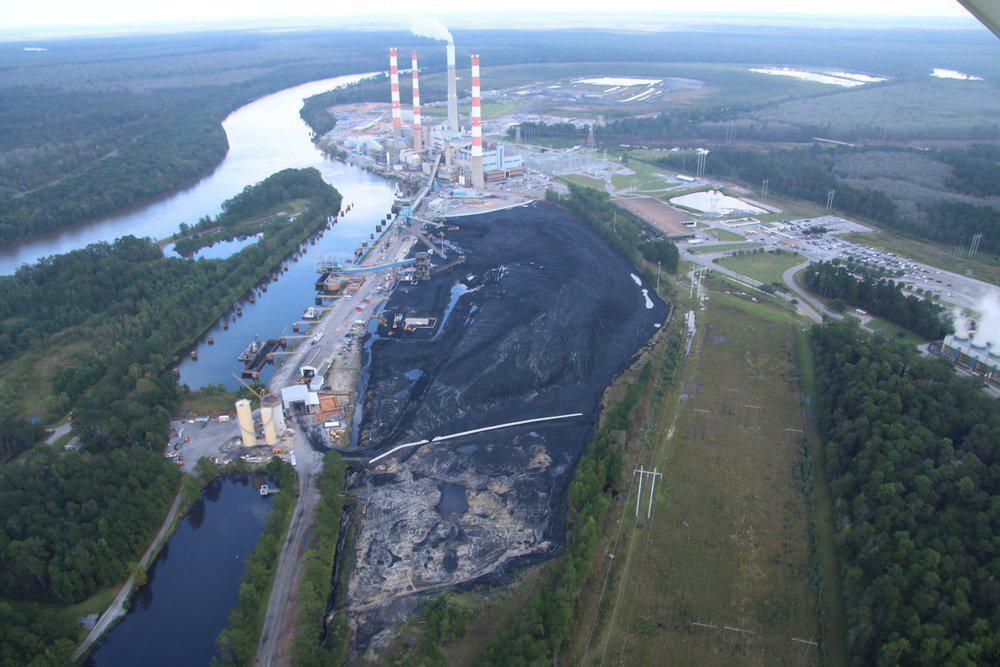An Alabama environmental group announced on Wednesday its intent to file a lawsuit against Alabama Power in response to plans for coal ash stored on the banks of the Mobile River.
The Mobile Baykeeper said the Southern Environmental Law Center sent a letter to the power company on behalf of the nonprofit. The Baykeeper claims Alabama Power has "plans to permanently leave more than 21 million tons of coal ash in unlined storage at Plant Berry."
Coal ash is what remains when coal-fired electric power plants produce power. It is a thin residue but builds to leave piles of ash. The Environmental Protection Agency (EPA) has worked for years to help power companies across the nation safely dispose of coal ash, although it has found only small amounts of the waste exceed the national standard for what makes a substance hazardous, based on federal guidelines. The EPA does prohibit the permanent storage of coal ash in unlined impoundments where the ash is in contact with water, the Mobile Baykeeper said.
The Southern Environmental Law Center has worked with numerous environmental groups in Alabama to go after Alabama Power over coal ash storage. After complaints about the coal ash from the Alabama power plants on the Coosa River, Alabama Power reported that it was in the process of closing all of its coal ash ponds in compliance with federal coal ash rules enacted by the U.S. Environmental Protection Agency in 2015.
The Mobile Baykeeper said Alabama Power is polluting groundwater with coal ash and could wipe out the lush, biologically diverse region should it be breached by heavy flooding, a hurricane or some other disaster.
The company's plan for the coal ash "jeopardizes so much of what makes coastal Alabama special,” Cade Kistler of Mobile Baykeeper said in a statement. “The Mobile-Tensaw Delta is one of the world’s most important resources and is vulnerable to increasing floods, severe hurricanes, and rising water levels. Leaving millions of tons of coal ash on the banks of the Mobile River is a disaster waiting to happen."
Plant Barry opened in 1965, located about 25 miles north of Mobile. With federal regulators imposing tougher rules on storing coal ash, the company has been working for several years to close the roughly 600-acre pond by drying it out, moving material to a smaller site nearby and covering it with a liner.
The company contends moving the material farther away would pose a hazard in itself.
“Alabama is an outlier when it comes to leaving toxic coal ash in place," Barry Brock, director of Southern Environmental Law Center's Alabama office, said in a statement. “This coal ash should be safely stored in a lined facility away from the river’s edge and out of the groundwater or recycled into cement and concrete, as is being done in other Southeastern states.”
You can read the entire letter of intent to sue here.
The Mobile Baykeeper said Alabama Power has 60 days to correct the problem, or a lawsuit may be filed in U.S. District Court.
Alabama Power Communications Specialist Anthony Cook provided 1819 News with a response to the letter of intent.
"As a matter of practice, Alabama Power does not comment on potential legal matters," said Cook.
In 2018, Alabama Power was fined $1.25 million for groundwater pollution violations near coal ash ponds at six other plants. In 2019, Alabama Power spokesman Michael Sznajderman said the company is going “above and beyond” what is required by state and federal coal ash rules, in some cases using redundant dike systems and subterranean retaining walls that extend 30 feet below the ground to prevent contaminants in the ash from reaching rivers or groundwater.
He said at that time the company believed that groundwater contamination near the ash ponds that resulted in $1.25 million in fines by the Alabama Department of Environmental Management (ADEM) will gradually decrease over time once the ponds are covered in place.
To connect with the author of this story, or to comment, email erica.thomas@1819news.com.
Don’t miss out! Subscribe to our newsletter and get our top stories every weekday morning.










